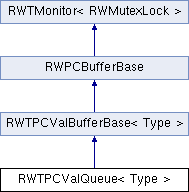 SourcePro® 2020 |
SourcePro® API Reference Guide |
Product Documentation: SourcePro Documentation Home |
First-in-first-out (FIFO) queue that provides producer-consumer synchronization semantics for exchanging values between cooperating threads. More...
#include <rw/itc/RWTPCValQueue.h>

Public Member Functions | |
| RWTPCValQueue (void) | |
| RWTPCValQueue (size_t maxCapacity) | |
| RWTPCValQueue (size_t maxCapacity, bool isOpen) | |
| ~RWTPCValQueue (void) | |
 Public Member Functions inherited from RWTPCValBufferBase< Type > Public Member Functions inherited from RWTPCValBufferBase< Type > | |
| virtual | ~RWTPCValBufferBase (void) |
| Type | peek (void) |
| RWWaitStatus | peek (Type &result, unsigned long milliseconds) |
| Type | read (void) |
| RWWaitStatus | read (Type &result, unsigned long milliseconds) |
| bool | tryPeek (Type &result) |
| bool | tryRead (Type &result) |
| bool | tryWrite (const Type &value) |
| void | write (const Type &value) |
| RWWaitStatus | write (const Type &value, unsigned long milliseconds) |
 Public Member Functions inherited from RWPCBufferBase Public Member Functions inherited from RWPCBufferBase | |
| virtual | ~RWPCBufferBase (void) |
| bool | canRead (void) const |
| bool | canWrite (void) const |
| void | close (void) |
| size_t | entries (void) const |
| void | flush (void) |
| size_t | getCapacity (void) const |
| RWTFunctor< void()> | getCloseCallback (void) const |
| RWTFunctor< void()> | getEmptyCallback (void) const |
| RWTFunctor< void()> | getFullCallback (void) const |
| RWTFunctor< void()> | getOpenCallback (void) const |
| bool | isOpen (void) const |
| void | open (void) |
| size_t | setCapacity (size_t maxCapacity) |
| void | setCloseCallback (const RWTFunctor< void()> &onCloseCallback) |
| void | setEmptyCallback (const RWTFunctor< void()> &onEmptyCallback) |
| void | setFullCallback (const RWTFunctor< void()> &onFullCallback) |
| void | setOpenCallback (const RWTFunctor< void()> &onOpenCallback) |
Additional Inherited Members | |
 Protected Types inherited from RWTMonitor< RWMutexLock > Protected Types inherited from RWTMonitor< RWMutexLock > | |
| typedef RWTLockGuard< RWTMonitor< RWMutexLock > > | LockGuard |
| typedef RWTTryLockGuard< RWTMonitor< RWMutexLock > > | TryLockGuard |
| typedef RWTUnlockGuard< RWTMonitor< RWMutexLock > > | UnlockGuard |
 Protected Member Functions inherited from RWTMonitor< RWMutexLock > Protected Member Functions inherited from RWTMonitor< RWMutexLock > | |
| RWTMonitor () | |
| RWTMonitor (RWStaticCtor) | |
| RWTMonitor (const RWTMonitor< RWMutexLock > &second) | |
| ~RWTMonitor () | |
| void | acquire () |
| bool | isAcquired () const |
| RWTMonitor< RWMutexLock > & | monitor () const |
| RWMutexLock & | mutex () |
| RWTMonitor< RWMutexLock > & | operator= (const RWTMonitor< RWMutexLock > &) |
| void | release () |
| bool | tryAcquire () |
RWTPCValQueue is a first-in-first-out (FIFO) queue that provides producer-consumer synchronization semantics for exchanging values between cooperating threads.
In the producer-consumer synchronization model, reader threads (consumers) are blocked while the queue is empty, and writer threads (producers) are blocked while the queue is full. A queue is considered full when the number of unread entries equals or exceeds some user-specified maximum capacity.
|
inline |
Constructs a value-based producer-consumer queue instance.
The queue is open on construction and enforces no limit on the number of items in the queue.
|
inline |
Constructs a value-based producer-consumer queue instance.
The parameter maxCapacity specifies the maximum number of unread entries to allow to accumulate within the queue. Once the number of entries in the queue equals this number, any thread attempting to write an additional entry is blocked until an entry is removed by a read() operation, or until the capacity is increased. A capacity of zero is used to indicate that the queue has no size limit other than that imposed by memory limitations, and that all write() operations should complete without blocking.
The queue is open on construction.
|
inline |
Constructs a value-based producer-consumer queue instance.
The parameter maxCapacity specifies the maximum number of unread entries to allow to accumulate within the queue. Once the number of entries in the queue equals this number, any thread attempting to write an additional entry is blocked until an entry is removed by a read() operation, or until the capacity is increased. A capacity of zero is used to indicate that the queue has no size limit other than that imposed by memory limitations, and that all write() operations should complete without blocking.
The parameter isOpen is a bool value that specifies whether the queue should be initialized in the open state, true, or the closed state, false.
|
inline |
Destructor.
|
Copyright © 2020 Rogue Wave Software, Inc. All Rights Reserved. |